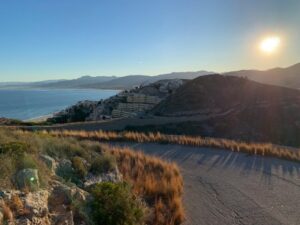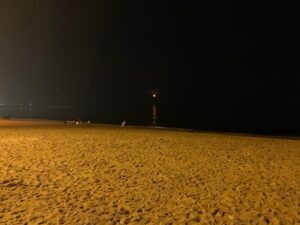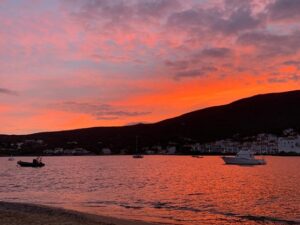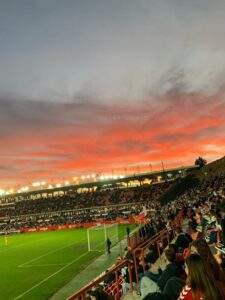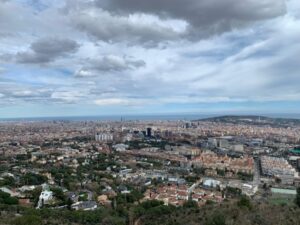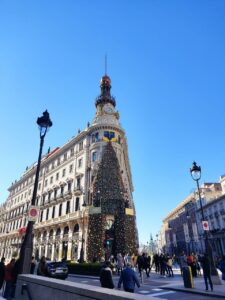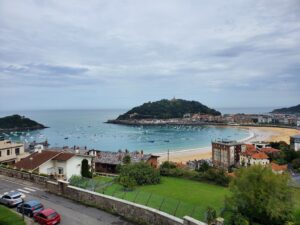Kategorie: ‘Spain’
My Internship at the EHU Bilbao
- Biology M. Sc.
- Spain, Bilbao
- Universidad del País Vasco (UPV)/ Euskal Herriko Unibertsitatea (EHU)
- 07/2024 – 09/2024
When I reached out to the Cell Communication and Transcription Lab at EHU Bilbao for a placement, I was quickly connected with my future supervisor. We arranged an online Zoom meeting, and from the start, I felt genuinely welcomed. She was incredibly helpful in organizing my stay, handling all the necessary university paperwork, and went out of her way to ensure everything was in place. It was at that moment I knew I would be well-supervised, and that this internship would be a great success.

© Jule Wahl
Although the university is located far outside the city, I was advised to find accommodation in the city center for better social connections and public transportation. I found my room on Idealista, a popular platform for finding apartments in Spain. For me, finding a reasonably priced room in a shared apartment near the river was relatively easy, but knowing at least some Spanish greatly helps in communicating with landlords, who often speak only Spanish. I ended up living with a girl from Catalunya, a girl from Peru, and one from France. Two of them were students, and the other was working. We got along really well, and they made every effort to make me feel welcome and comfortable in the flat. While we didn’t spend much time together in the end, it was still nice getting to know them!
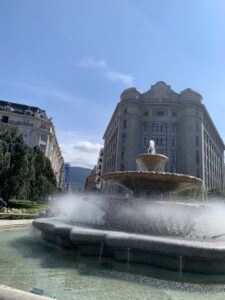
© Jule Wahl
My first impression of the city was different from what I expected of a typical Spanish city. This is because Bilbao is not quite Spain—it’s the Basque Country, something I later learned is very important to acknowledge. The architecture reminded me more of Central Europe, with modern and stylish buildings. The Nervión River flowing through the city provides a contrast to the otherwise dense urban landscape, creating a special atmosphere, especially at night when the lanterns reflect off the water. I really enjoyed taking walks by the river towards the old town, chatting with friends or responding to voice messages, as there are parks and green spaces along the way. The old town (Casco Viejo) is beautiful to explore and becomes even more vibrant at night. Every day of the week, you can find people enjoying drinks and Pintxos, the Basque version of tapas. My favorite Pintxos were the mini burgers and slices of baguette topped with various salads.
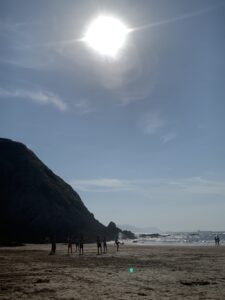
© Jule Wahl
Nature in Bilbao is lush and green, thanks to the high humidity and frequent rain. The surrounding hills and mountains offer excellent hiking routes with stunning scenery, such as the trails around Trapagaran. About 40 minutes from the city center by public transport, you’ll find large, beautiful beaches with breathtaking cliffs and sunsets. My favorite was Sopelana Beach, which I highly recommend for a spectacular sunset.
Because my stay coincided with exam season and the university’s semester break, there weren’t many students on campus, and the Erasmus students left a week after I arrived. However, I was part of the Happy Erasmus WhatsApp group for Bilbao, which allowed me to join their last gathering. Not knowing anyone in the city, I simply asked in the group chat if anyone was going out that night and if I could join them. A really nice Czech girl replied, and we met up with her group for a pre-party. We clicked instantly and had a fantastic night, which ended with a spontaneous swim in the sea. We went to a techno club called Sonora, which was a nice change from the usual bachata and salsa music. In general, Bilbao doesn’t have many clubs; it’s more common to go to small bars, particularly in Casco Viejo, where you can dance to loud music. If you’re looking for an experience full of partying and socializing with Erasmus students, I recommend coming during the semester when there are more activities and it’s easier to meet people. I also attended some language exchange meetings that I found on the Meetup app (which I highly recommend for meeting new people in a new city!) and created a Bumble BFF account specifically to find friends.
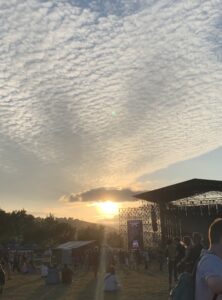
© Jule Wahl
During my stay in Bilbao, I was eager to follow the Euro 2024 football tournament in Germany, especially in the company of others. I heard about a German bar that always showed football matches, so I went there for the Germany games. I struck up a conversation with a group of young Germans, and we immediately hit it off. They were taking a language course in Bilbao, and from then on, we watched all the games together. The bar is also worth visiting—the owner is very friendly, and you can speak German with him! While I didn’t try the food, I heard great things about it. We watched the final at a public viewing event in Parque de Doña Casilda, which culminated in Spain’s victory. I also attended the popular BBK Bilbao festival, held on a hill just outside the city. It was easy to get there by bus, and we walked back afterward. I asked in the Erasmus WhatsApp chat who was going and if I could join, as I didn’t want to go alone. Fortunately, a German guy replied, inviting me to join him and his friends. We had an amazing evening, with the highlight being dancing to Jungle’s live performance. Bilbao and the surrounding towns have a lot to offer young music lovers, with numerous street fiestas and concerts during this time of year.
I highly recommend exploring the various towns around Bilbao, such as Portugalete, Santurtzi, Getxo, and Muskiz, which offer beautiful nature and charming towns. A day trip to the stunning city of San Sebastián is also well worth it, and the bus tickets are quite affordable! You can also easily travel to Madrid, Santander, Zaragoza, Vitoria-Gasteiz, Burgos, and other cities by bus or train, and if you prefer to fly, there are plenty of low-cost options to explore all of Spain.
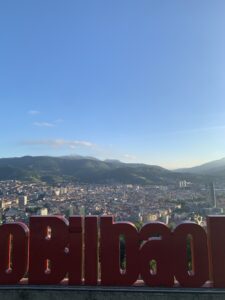
© Jule Wahl
My academic experience was also incredibly valuable. I learned a lot of methods and concepts related to working with mammalian cells and maintaining them in culture. The atmosphere in the lab was everything I could have hoped for, helping me realize what aspects are important to me in a working environment. I made many friends and colleagues who enriched my network, and I plan to stay in touch with them. This experience made me more open to meeting new people, finding ways to connect, and getting along with them right away. I’m certain it shaped my character in ways that only an experience abroad can.
My Erasmus Traineeship in Valladolid
- Medicine
- Spain, Valladolid
- Universidad de Valladolid
- 01/2024 – 06/2024
My name is Felix and I’m a medicine student from Aachen, Germany. This year I spent 6 month of my practical year taking part in a hospital Internship at the University of Valladolid in Spain.
Preparation
As for the preparation I first reached out about a year before my stay to the Erasmus coordinator and the dean of the Faculty of Medicine at the university. Although sometimes hard to reach, he will eventually answer you and help you with whatever request you might have. He recommended me to contact two other doctors to organise the different parts of my internship. Eventually I organized my stays with the respective heads of the different departments and presented my final rotation in internal medicine and surgery to these two doctors to get their confirmation.
Arrival and Organisation
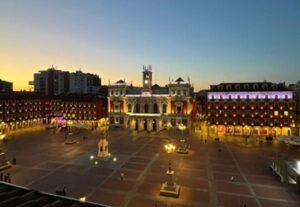
©Jan-Felix Wolters
I arrived 1 week prior to the start of my internship, which gave me time to visit the international office and organize the formalities. Although I could not be matriculated without taking any assignments, they were very helpful and worked out a way to provide me with the student badge. That way I could take part in the university sport and other programs, such as the GUM, which is a group of students and other people that go on hikes every 2nd Sunday throughout the entire year. In order to get set up for the hospital, I had to go to the Dean’s office, where the friendly employees helped me go through the process of registering for my internship, which included receiving my nametag and clothes for the hospital. For this process a “Certificado de los delitos sexuales” is necessary. This was very easy to get at the local state’s office. I got a date within 3 days and it only took them 1-2 days to get the necessary information from Germany and to send me the certificate via email. All in all the people were always very friendly and helpful which made the process easy, even though some things couldn’t be resolved right away.
Accommodation
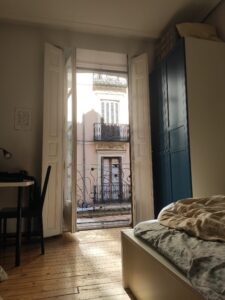
©Jan-Felix Wolters
Accommodations in Valladolid are surprisingly cheap and easy to find. Rooms in a shared flat generally range between 180 and 350€. Studios aren’t much more expensive either. The main website used is Idealista, but you can also find rooms through facebook (watch out for scammers). I wanted to get to know people which is why I was looking for a flatshare. After only about 3 days of search I found a very nice room in a central apartment right next to the main shopping street. Although not very good equipped and a bit lived through, the apartment was very nice and that way I got to know other international people. It is worth to mention that in Valladolid (and other Spanish cities from what I’ve heard) it’s common for landlords to take away money from your bond, or even the whole bond without indicating a reason. It seems to be a way of making extra money off international students, who usually can’t do much about it. After this happened to some of my roommates as well, I decided to not pay my last months rent and leave the bond to the landlord, which is a common strategy.
The City
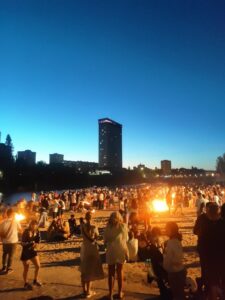
©Jan-Felix Wolters
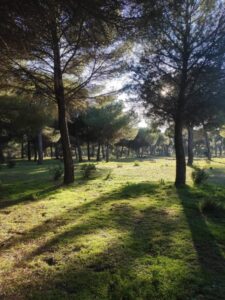
©Jan-Felix Wolters
Valladolid wouldn’t have been the city of my choice if it weren’t for my girlfriend, who is from there. My expectations weren’t very high, and got easily excelled by this mid-sized city in central Spain. It has a beautiful historic centre and even an artificial beach at the riverside. Located about 1 hour from Madrid by train and 2.5 hours from the north coast by car, the city is particularly well located in Spain. It gives you the possibility to regularly visit the capital or to rent a car for a cheap price and spend the weekend at the sea, surfing or enjoying the incredible nature of the north. What is more, it is surrounded by the beautiful and historic cities of Castilla y León, such as Salamanca, Segovia, Burgos and León, which are all worth a visit. Being the capital of its region is what makes Valladolid a very attractive city. While the weekdays are rather calm, on the weekends it attracts plenty of people from all around. This leads to the city offering a large variety of activities, sports, restaurants, bars and results in a high quality of living. The city hosts many events throughout the year, including regular and free public concerts on the Plaza Mayor, theatre and music festivals and the famous San Juan in June, where everyone goes to the beach to enjoy the longest night of the year at a bonfire. Valladolid also offers beautiful parks and an immense amount of terraces, where you can find some of the best and cheapest tapas in all of Spain. Drinks and food are extraordinarily cheap, which allows you to spend a big amount of your time outside, enjoying the Spanish way of living. Personally, I loved that it’s very easy to leave the city by bike or bus and be in the nature in the blink of an eye. It is also worth to mention, that the Spanish in Castilla y León is considered the clearest and easiest to understand in all of Spain.
The Hospital
I spent 2 months of my Internal Medicine internship at the Hospital Río Hortega and my 4 months of surgical internship at the Hospital Clínico. I can recommend both hospitals. While Río Hortega is a very modern and well equipped hospital located outside the city centre (12-15 minutes by bike), Clínico is located right in the heart of Valladolid, next to the Faculty of Medicine and has a nice and familiar touch to it. Generally it is important to say, that Spanish medicine students don’t get to participate in the daily hospital work near as much as German students. The working hours are from 8am to 3pm, but the doctors might leave earlier when the daily ward round and the examination of the patients are done. In Internal Medicine, the tasks are limited to following your assigned doctor and examining the patients. The doctors are generally very open and willing to explain you everything. There is no time pressure which leaves plenty of time to explain diseases and procedures. But the low patient flow also leads to a lower input compared to other countries. The emergency department was the only department where I got to assess my own patients and right down the anamnesis and reports before discussing the procedures with the doctors. In the surgery departments the Spanish students rarely take part in the surgeries. I was lucky to get to know a couple of doctors who would regularly let me take part in surgeries and perform assisting tasks like holding hooks, unscrewing screws or sew a few stitches. Although I definitely learned new things it was probably less compared to spending the same amount of time in a German hospital.
Conclusion
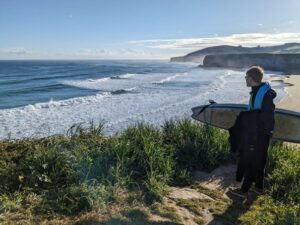
©Jan-Felix Wolters
I had a great time throughout my stay in Valladolid and am very happy to have gotten to know the country, the city and the people. Valladolid is a beautiful city and has much more to offer than one would expect at first glance. It may not be able to compete with Spains major cities when it comes to the cultural offer and nightlife but impresses with a high quality of life, easy access to the nature and a cheap cost of living.
Research Internship in Valencia
- Chemistry M.Sc.
- Spain, Valencia
- Universitat de València
- 01/2024 – 04/2024
Application and finding an internship:
After careful consideration, I was convinced that Valencia was the right city for me. I had heard many good things about Valencia: the city seemed to offer what I was looking for, and, as I expected, people spoke “normal” Spanish.
Subsequently, I wrote emails with my resume and academic transcripts to professors and group leaders at universities and some independent institutes. My recommendation would be to reach out to as many as possible. Out of 25 recipients, approximately 15 responded; 10 were unavailable, lacked capacity, or only took interns for longer periods. Among the 5 positive responses, I scheduled short meetings with 2 individuals to make the most informed decision possible. In the end, I decided to do an internship in inorganic chemistry at the University of Valencia. The professor spoke good English, the laboratories were spacious and modern, and I had the feeling that they were happy to have an additional motivated employee.
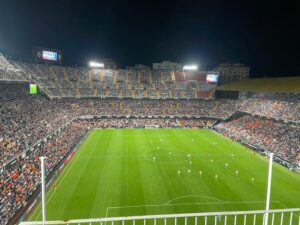
© Jona Sieberg
Accommodation & Living Expenses:
I found searching for accommodation from Germany, without knowing Spanish, to be quite challenging. While many recommended Idealista as the best possible website, where you can find a lot, I ultimately found my apartment through Uni-Places. Although there was a fee involved, it also provided a certain level of security against scams. I live incredibly centrally, not really close to the university, but with the free public transport (for people under 30), I can reach my workplace in 35 minutes. However, I have found Valencia to be very well connected, so the exact location of your flat is not so important.
When I first started looking for an apartment I would have liked to live alone, but decided to go for the cheaper option of a shared flat. In retrospect I would now strongly advise everyone to do the same. Social interaction and contacts are one of the core elements of an Erasmus stay, which should not be missed at any point. Based on my experience with shared accommodation and hearing about others’ experiences, there will always be pros and cons, but I have not heard from any situations that were unbearable.
Sidenote: During the summer months, a room without air conditioning is maybe somewhat bearable but not very desirable.
Monthly expenses for groceries in the supermarket are certainly somewhat lower than in Germany, although not by much. The only thing that is a little more expensive than what we are used to is Ice-cream. Everything else depends on your lifestyle.
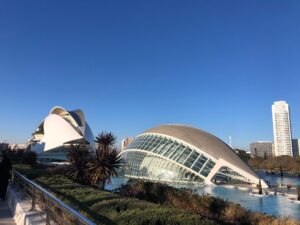
© Jona Sieberg
Prices for shared rooms range from approximately 300 to 550 euros. Clubs are often free through Erasmus organizers, and restaurants and gyms are also slightly cheaper than in Germany.
Everyday Life / The Internship:
My internship itself didn’t really differ from similar tasks in Germany: I worked in the laboratory, sometimes under supervision, mostly independently. Only the feeling of arriving in a group of Spanish people, making friends, and then also doing things together outside of university felt even cooler. I dealt with great people, a relaxed yet dedicated professor, a doctoral student with whom I couldn’t have gotten along better, and a generally very friendly group. The willingness to help each other was high, working hours were very flexible, and hierarchies were flat.
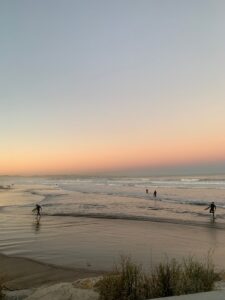
© Jona Sieberg
In this regard, my impressions were minimally different from Germany. I was usually in the lab between just before 10 am and 6 pm, but as everything was relatively relaxed, a lot of it was voluntary. Overall, there was certainly time for sports, activities on the weekends, and enjoying the feeling of living in Spain! I found it to be a great opportunity to expand my knowledge, learned a lot, and certainly gained more confidence in my abilities through the experiences I had.
The biggest difference in everyday life: You don’t have to look out the window to know what the weather is like. Valencia lives up to its promises and offers, although it may not be the most beautiful city in the world, good weather, nearly every day.
My hope was to make great progress in Spanish as well as gaining professional experience. This is perhaps possible if you already speak relatively good Spanish, but as long as English is still much easier for both sides, I had little success. The university, as the place where I spent most of my time, is simply unsuitable for this, as people here speak generally better English than elsewhere.
Free Time / Tips:
Beach, great weather, culture, local markets, the feeling of a big but not too big city, clubs, parks, huge university campuses, and all of it easily accessible. As mentioned, there is certainly no shortage of options. Erasmus organizations offer a particularly easy entry, offering a variety of activities. For example, I participated in their surfing and beach volleyball offerings, parties, and excursions. The excursions, in particular, are very pleasant because you can reach nearby cities or locations relatively inexpensively. Especially the mountains, which are otherwise difficult to reach without a car.
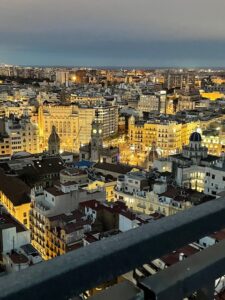
© Jona Sieberg
Valencia certainly does not lack bars where you can sit down nicely in the evening. Additionally, there are also many opportunities to sit outside with your friends. If I were to make a recommendation, I would suggest the very authentic Mercabañal, located very close to the beach.
As an absolute Erasmus hotspot, one should not expect to only deal with spanish people. On the contrary: It is very international, and this is reflected wherever students are. While I mainly dealt with Spaniards in the lab, my roommates and the visitors to clubs and bars were often from abroad.
I used my free time a lot to do sports, often in the gym, partly because it was often much cooler there. Running is a bit less pleasant in Valencia than in Aachen, but with the Turia (the largest park that leads in a semicircle through the city), there is an extremely bicycle and jogger-friendly park. Various football fields are also located here, where people often meet up through WhatsApp groups.
Conclusion:
I can highly recommend Valencia as a destination for an Erasmus stay. At the end of my time here, I feel like I have participated in the hustle and bustle of a Spanish university and made progress in my field, as well as had a great time in Spain. The only thing Valencia doesn’t offer is the feeling of being in a super fancy metropolis with incredibly modern skyscrapers. For everything else you hope for from your stay abroad, Valencia offers the ideal conditions. You just have to do it! Have fun!
Internship in Bilbao
- Business Administration and Engineering: Mechanical Engineering M.Sc.
- Spain, Bilbao
- FEV Consulting Iberia
- 10/23 – 02/24
Application/Finding an internship
I started the internship search for an internship in Spain very early (about 5 months before the start of the internship), as it is advisable to expect sufficient lead time for applications
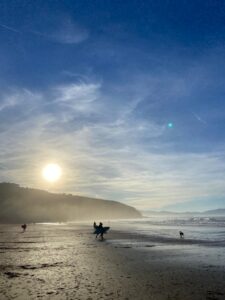
© Johann von Harling
Surfing beach in Sopelana
for internships abroad. I narrowed down the internship search to Spain because I am very interested in this country and also wanted to deepen my language skills. My approach to the application process involved systematically identifying companies in my area of specialization through internet research and searching for internship openings in the Career section of each website. Additionally, I also sent spontaneous applications to smaller companies. With larger companies, there is a greater likelihood that English is required or accepted as a working language. Many companies require foreign interns to complete the internship for longer than 6 months due to tax benefits, which limited my application to numerous companies. In the end, I found a German company with a location in Spain (Bilbao), which operates internationally in the field of technology consulting for the automotive industry and other technology sectors. I applied and had to go through the traditional application process for an internship in management consulting, consisting of two rounds of application involving interviews and solving a case.
Accomodation & Living expenses
For accommodation, I would recommend starting to look for apartments/rooms very early as well. Bilbao is one of the most expensive cities in Spain alongside Madrid and San Sebastian. Prices are generally comparable to those in German student cities, but they can also quickly rise to €600 or €700 for a shared room. However, it is also possible to find some very affordable rooms for around €300 with lower living standards.
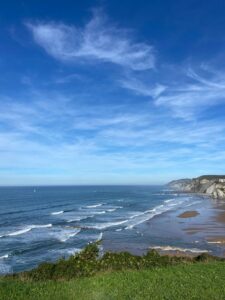
© Johann von Harling
Cost near by Bilbao
When viewing apartments, it is important to ensure that the windows are reasonably insulated for winter stays, and in summer, having air conditioning in the apartment may be necessary. When I arrived in Bilbao in October, the first few days were still very warm, with temperatures reaching up to 35°C. However, temperatures in winter also drop to very low values of around 0°C to 10°C, so having heating and well-insulated windows can contribute to comfort. Many students in Bilbao live in neighborhoods like Indautxu, Deusto, or Casco Viejo. However, there are apartments scattered throughout the city. Idealista is highly recommended as a portal for apartment hunting in Spain. Alternatively, you can also search for real estate agencies online. Bilbao is a relatively modern city for Spain, with many high buildings. On the other hand, it also has a beautiful old town area in Casco Viejo. The average living costs are quite comparable to the living costs in Germany although visits in restaurants and bars can be significantly cheaper from time to time. Prices in supermarkets are very much the same as in Germany, but the costs of a visit in bar or a restaurant can be regarding the restaurant a lot cheaper. It is also recognizable that Bilbao has one of the highest densities of Michelin Star restaurants in Spain and if you like you can as well try out the excellent cuisine.
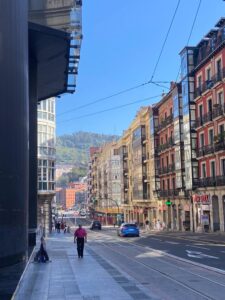
© Johann von Harling
Bilbao offering excellent transportation options with tram, metro, bus and train
Everyday life/ the internship
I completed the internship full-time, mainly in the office in downtown Bilbao. The atmosphere within the international team was very professional yet friendly outside of working hours. The predominant language in the company was English due to international projects. However, the conversation would also occasionally switch to Spanish or German, which I enjoyed and which contributed to improving my language skills in several languages. The internship involved working on technical projects, which were well-suited to the knowledge gained from studying industrial engineering. Projects in the field of electromobility, artificial intelligence, and general automotive production were the focus. The working hours for a consultancy were mostly between 8:30 am and 7:30 pm, which included most times a lunch break of half an hour to one hour, where we sat together with all the employees. Usually in the week most time was spent at the office and free time afterwards in walks around the various streets in the city and weekends were used to do bigger journeys and small trips within the near of Bilbao or other cites in Spain.
Free time/tips
Leisure time in Spain, especially in Bilbao, can be very diverse depending on the season. During the warm autumn days, trips for hiking, relaxing, swimming, and surfing along the coast of Bilbao are highly recommended. With the metro, you can reach the vicinity of the beach for €1.50 within 30 minutes and then reach it on foot after a short hike (15-20 minutes). The coastline consists of steep cliffs and long beaches. Additionally, you can also utilize the surrounding mountains near Bilbao on weekends for short hikes to get a view over the entire region. Bilbao is located in northern Spain, and there are many noteworthy cities nearby such as Santander, San Sebastian, Pamplona, Zaragoza, or even Madrid. The Cantabrian and Basque regions, in general, are highly recommended for excursions. A recommendation to create more leisure time during the internship is to strategically choose vacation days to have long weekends, allowing for short trips to more distant cities like Barcelona, etc.
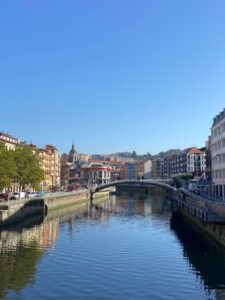
© Johann von Harling
Bilbao city quarters seperated by river
A recommendation for Bilbao is to explore the culinary diversity of Spanish specialties offered in many small local eateries. There is a rich culture of pintxos (tapas) available at many times of the day. Furthermore, Bilbao offers a lot of culture with the world-famous Guggenheim Museum or the football matches of the renowned Spanish football club Atletico Bilbao, which take place in the San Mames Stadium. I really enjoyed the internship because during that time, occasional team events were organized in which employees could participate, happening on weekends or after work. For example, there was the Bilbao Marathon, in which we could participate in various distances such as 10 km, half marathon, or marathon. During this race, the entire city was closed off for one evening, with about 13,000 people participating and many thousands more cheering on the streets of Bilbao.
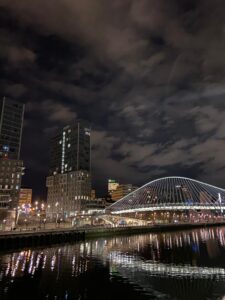
© Johann von Harling
Bilbao with modern buildings in the city center
Conclusion
An international internship is recommended for students who want to improve their language skills in a language other than their native language, are interested in new cultures, and at the same time want to experience the working style in another country within a company. Living abroad provides a different perspective on many things and broadens one’s horizons. The internship offers a very good opportunity to combine the interest in international experience with the interest in professional experience. In addition to the internship, you have the opportunity to explore new cities, different places, and another culture. Spaniards exude joy of life, which is recognizable in many everyday situations. Next to working, I really enjoyed the trips we organized either with working colleagues or with friends, where we could further explore the great cities and landscapes of Spain and discover even more how diverse this country is.
I am very glad, that I had this opportunity supported by Erasmus Internship, that offered me to experience the work culture as well as the live and culture in a different country. I hope that many people will also have this opportunity and support to experience such great possibilities.
Research Internship in Tarragona
- Chemistry M.Sc.
- Spain, Tarragona
- Institut Català d’Investigació Química
- 10/2023 – 02/2024
1. Application/Finding an internship
Before I applied for the research internship I did not have a clear idea which place to go. During the course of the chemistry master in Aachen it is necessary to do two to three research internships and I knew that I wanted to do one of them abroad. So, I asked the supervisor of my bachelor thesis whether he can recommend me some places to go. He directed me to a professor at the ICIQ in Tarragona which is a non-university research institute, perhaps comparable to the Max-Planck institutes and the likes in Germany. From looking at the group’s website I found the chemistry interesting and so I sent an e-mail with an application to the professor at ICIQ. He replied that he would be happy to host me, so we filled the required paperwork for the Erasmus internship.
2. Accommodation & Living expenses
When dealing with the bureaucracy of the stay, a secretary of ICIQ offered me a studio apartment of ca. 20 sqm total to rent. Despite its small size it was outfitted with everything one needs, like an oven, stove, refrigerator and washing machine. The biggest drawback was that I did not have a real bed but slept on a sofa bed instead. Looking back now I should have looked for a flat myself to first meet people outside of work and second because it was quite expensive (650 € per month), thereby consuming almost the entire Erasmus scholarship. There are cheaper options in Tarragona even though it was located in part alta, which is the historic centrum of the city. Travelling to Tarragona from Germany by ‘green’ means is relatively easy. There is a direct Flixbus connection from Cologne to Barcelona, taking about 18 h. This has the advantage that one piece of luggage is already included and more can be bought for 5 € a piece. From Barcelona it is only a short train ride to reach Tarragona. As far as I know there are no student dormitories like in Germany in Spain or they exist to a much smaller extent. Moreover, it is more common to continue living with one’s parents while studying so there is not something like a student quarter in the city.
Living in the historic center of the city has the advantage of being close to the historic landmarks of Tarragona, the cafes and restaurants as well as many cultural events such as the carnival celebrations. On the flipside the ICIQ is located on the outskirts of the city. Because of this, the walking distance to work was almost half an hour each way. Apart from the cost of the studio, I would say the living expenses are quite similar to Germany. Groceries are roughly the same price, but I really enjoyed the Spanish vegetables quality. I recommend to get a Spanish SIM card as the services are much cheaper than in Germany. There was no WiFi in my flat but I got 100 GB of prepaid mobile data for 20 € a month so I just used my phone’s hotspot for accessing the internet from other devices. If one has a Spanish bank account and is therefore eligible to get a plan it can be even cheaper.
However, I spent more money per month than I usually do because I went out much more. In my experience the culture in Spain is very different in that regard to Germany. I rarely met up with people at one’s home as you would do in Germany. Instead we went to the many, always well filled cafes and restaurants, for example to have some olives and vermouth in the afternoon. I spend a lot of time with my colleagues who were very welcoming and generally super nice people.
3. Everyday life/The internship
On a typical day I would wake up at around 8 am, have breakfast and then walk to the institute, so I would arrive around 9 am, if there were no meetings with the group or presentations scheduled earlier. We had one weekly group meeting in which several members of the group had to present their recent work which was then discussed among the group. Moreover, further regular group activities included literature, in which someone from the group presents a recent paper and subsequently leads the discussion in the group, topic, a more extensive version of literature where the basics of the specific niche are also explained and problem session. In this activity a member of the group prepares a total synthesis, removes some of the information like the products and/or conditions of the individual reactions and the group then has to figure out the synthesis and the mechanisms of the separate steps. I think most of these activities are pretty standard in academic groups in chemistry.
Apart from this we had subgroup meetings every three weeks to discuss our results and what needs to be done in the future more personally with the professor. The majority of my time in the institute I spent doing chemistry and trying to make the things work we talked about in subgroup meetings. In general, I had a lot of freedom after being put on one of the group’s project in the beginning in regard to which things I wanted to achieve and the methods used to get there within this project, which I really liked. I always felt like my opinion was valued and respected and there was a great sense of equality within the group. I never had the feeling that some of the PhD students or Post-Docs looked down on me or automatically valued my opinion less because I am a master student, which in my experience cannot be taken for granted.
The same applies to the use of the group’s and institute’s equipment. Everyone had the same rights in the access to it. Both the group and institute have great equipment. For example, the supply with glass-ware and technical equipment like GCs, LC-MS, GC-MS, glove-boxes etc. in the group is excellent. The institute shares more equipment like several NMR machines, which almost always made for very quick measurement times. Also, the institute hosts a whole analytics department, where one can submit among others HRMS and X-ray samples. In addition, there is a HPLC unit which can separate small quantities of sample for you. The digital equipment is very modern as well. There is a well-working chemical inventory for the single work groups and the institute as a whole. Everyone uses a digital lab journal to track their experiments, making it very easy to share results and procedures with colleagues. Though, because I am a master student, I was not provided with a PC at work and had to bring my own laptop every day.
Since there were many people in my group, I had to share my fume hood for the last one and a half months of my stay. Because the fume hoods are big this was not too much of an issue. The laboratories are quite large, in my group there were seven to ten people in one lab. Unfortunately, the ICIQ currently does not have canteen. There is one at the nearby campus of the university URV but it is not comparable to the mensa in Aachen. Prices are generally much higher (comparable to the prices for external people in mensa) and most days there are little to no vegetarian options. Because of this almost everyone brings their own food to work every day, so I had my lunch in the break room with my colleagues most days.
Most days I stayed in the laboratory until between 6 to 8 pm. On weekdays the institute is opened from 7 am to 10 pm and Saturdays from 7 am to 5 pm while it is closed on Sundays. I only worked on Saturdays on exception and I want to highlight that I worked these relatively long hours because of my own choosing as I really liked the chemistry I was doing and wanted to make progress. Nobody put on any pressure on me to work as much as I did and when I wanted a few vacation days it never posed any problem. Same as with the exact contents of my research I enjoyed a lot of freedom in my working hours. If one wants to have a more time off during an internship it is definitely possible.
In the beginning of my stay I had to undergo a lot of safety instructions like written tests, a presentation and a walk through the institute. I was provided by the institute with two lab coats and safety glasses. About one month into my stay I got into a laboratory accident were a splash of DCM entered my eye. Luckily, my lab colleagues were quick to aid me and washed my eye first with a special solution intended for these purposes and then water. They also alarmed the institution’s security department. A worker of this department then continued to wash my eye with salt water before taking me and a Spanish-speaking coworker to the hospital, where an ophthalmologist checked my eye for lasting damage. Luckily, there was no such damage and I was prescribed antibacterial eye drops. Nevertheless, my eye got infected because of the irritation caused by the DCM and I had to go to the hospital two more times during the next week. In the end it healed perfectly fine and I have no damage in my eye. The insurance of the institute handled everything with the hospital great so it was not stressful for me in that regard and I am very grateful to the lab mates and ICIQ employees who helped me.
The language of my stay was English as my group was very international, with only about 25 % of the group members being Spanish. Therefore, all communication within the group was in English. I do not know whether my language skills got better during the stay as I like to think that I was quite proficient before. Before the internship I also studied Spanish in university for a semester and longer in private. Unfortunately, I do not believe that it got much better during the stay. First of all, as discussed before I did not use it at work and second in my experience many people outside of work preferred to speak Catalan instead of Spanish (which are two different languages) as Tarragona is located in Catalonia. When they noticed I did not speak Catalan many switched to English right away. This meant I spoke very little Spanish during my stay.
Possibly because of the group’s internationality many group members do not know too many folks outside of work in the city, so we spend a lot of time outside of work together. Big cultural events like Christmas were also celebrated in the institute with the Catalan traditions or within the group. For example, we went to a fire place to do Calçotada with the group. In this tradition spring onions are burned in a fire. The outer layers are removed and the spring onion is eaten whole with a special sauce. I much appreciate that I got to experience these traditions.
4. Free time/Tips
A great way to spend part of the weekend is to support the local football club Gimnàstic de Tarragona (often abbreviated to Nàstic) in their fight for promotion to the second Spanish league. Usually about 5.000 to 10.000 people visit their games, creating a vibrant atmosphere, even though it cannot quite compete with Alemannia Aachen ;). Tarragona used to be an important roman city (named Tarraco), as it was their first permanent settlement on the Iberian Peninsula. Since the city’s population remained smaller than at its peak height in roman times until well into the 19th century a lot of the roman architecture is still standing today. The amphitheater located directly at the beach for example is part of the UNESCO world heritage. It is among six attractions from antique times and the middle ages which can be visited with a bundled pass for 15 €, an investment that is well worth its money. The surroundings of Tarragona also feature nice nature and hiking paths to explore it. For example, I once hiked to the roman aqueduct which is located 4 km outside of the city and its impressive to imagine that it has stood there for 2.000 years.
If you like climbing there is also a famous rock climbing area outside of the nearby city of Reus. Reus and Tarragona have kind of a rivalry going on as they are by far the biggest cities in the area. Reus can be reached by a regular bus service from Tarragona in about 30 minutes. I often went there as there unfortunately is no climbing gym in Tarragona but there is an excellent one in Reus I can recommend. Apart from this the city of Reus is surely worth a visit on its own. In the Christmas time there are nice markets where once can buy artisanal foods or typical Christmas accessories of the region like a Caga tió or the Caganers. Most smaller cities around Tarragona can also be reached by bus services. In addition, Barcelona is connected by rail to Tarragona. The ride takes 1 h 15 min to 1 h 45 min, depending on the train, allowing for many weekend trips. Supporting this is a current promotion of the Catalan railways in which one can buy an indefinite use ticket for four months for a specific route for only 20 €. If within this timespan one uses it at least 16 times, you even get the 20 € back! Tarragona possesses a separate high-speed train station on the route Barcelona-Madrid as well. This station is located 8 km outside the city, so it is connected to the city center by bus. From there, travelling to Madrid takes only two hours and connects to the whole Spanish high-speed rail grid.
Furthermore, Tarragona is located on the Mediterranean Sea and has some beautiful sand beaches alternating with small cliffs, so I often enjoyed taking evening walks along the coastline. Up until the middle of November the water was also still warm enough for me to enjoy swimming in the sea. Many people possess beach volleyball sets, so during the summer the beach is filled with beach volleyball courts. Obviously during the winter, the weather is much better than in Germany. The temperature rarely dropped below 10 °C and sometimes exceeded 20 °C in February, enabling outdoor activities year-round. Once a week I played football on a pitch belonging to a nearby school with a group of students and workers of the ICIQ and the nearby university URV.
Before I mentioned that I went out a lot for food and drinks. As a vegetarian I would say it is a little harder than in Germany when eating out. When going out for Tapas there are usually enough vegetarian options (at some places you might have to order every available one to get fed) but otherwise one can sometimes be somewhat restricted to only one to three dishes to choose from in total. In the worst case, almost every place offers Patatas Bravas, so one can reliably fall back on that. Vegan options however can be much direr, so you should check beforehand if there is something available for you. When cooking for myself though I found myself in paradise. The vegetable quality and variety available is amazing so vegetarian or vegan cooking is a blast.
5. Conclusion
Looking back, I had a great time in Tarragona. The people I met were super nice and welcoming. I hope that I have made some lasting friendships. Also, I experienced some Catalan culture, like carnival, the Christmas traditions or Calçotada. In and around Tarragona there are many cool options to spend one’s leisure time. Regarding the work I experienced a lot of freedoms and I found the chemistry I did super interesting. I also really liked the culture and atmosphere at ICIQ. Therefore, I can wholeheartedly recommend a stay in Tarragona and I will definitely come back either for vacation or to work.
Internship in Bilbao
- Business Administration and Engineering Mechanical Engineering M.Sc.
- Spain, Bilbao
- FEV Consulting Iberia
- 10/2023 – 01/2024
- Application/Finding an internship
Securing my Erasmus internship at FEV Consulting in Bilbao was a smooth process, given my already six-month experience as a working student at the company before applying. Informal discussions with my mentor paved the way, expressing my interest to the Bilbao office head during a professional reunion further gave me the opportunity.
Drawing from the experiences of previous German interns in the company, I tapped into an established network to gather insights and advice. What helped the process further was the early acceptance, granted six months before the start date. This provided enough time to plan and fulfill all Erasmus requirements, ensuring a well-prepared transition into this international experience.
- Accomodation & Living expenses
Securing accommodation in Bilbao proved to be a straightforward process. I aimed for a room in a recently established apartment, sharing the space with three others of working age. The monthly cost of the room was around 600€, exclusive of management and cleaning fees, alongside a one-month deposit.
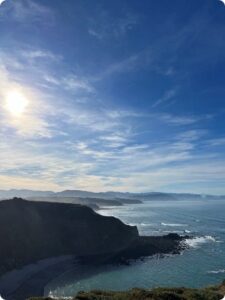
© Tom Benjamin Rummel
An advantageous aspect of my housing arrangement was the ability to review the apartment and complete the contractual formalities online prior to my arrival in Bilbao. This ensured a good transition before reaching my destination. Fortunately, my flatmates were predominantly Spanish speakers, affording me an ideal environment to practice and enhance my language skills within the rooms of my residence.
Financially, I received the Erasmus fee along with the minimum Spanish salary paid for my internship. In terms of living expenses, Bilbao’s cost of living equal my experiences in Aachen. But social outings are more economical, with soft drinks, beer, and wine averaging around 2€ per drink. Additionally, the culinary delights of the region (Pintxos, small tapas on bread) range from 2 to 3 euros per piece.
The public transportation system, particularly the metro, benefits from state subsidies, making it exceptionally affordable. A standard metro fare amounts to approximately 50 cents, contributing to the overall accessibility of transportation within the city.
- Everday life / the internship
Managing my everyday life during my Erasmus internship at FEV Consulting in Bilbao was a dynamic experience. Throughout the workweek, my days were filled with a good workload, leaving little time for activities beyond sports and cooking post-work.
While the option of working from home was available, it was relatively uncommon. I chose to commute to the office daily, a practice that proved to be beneficial. Leaving my laptop at the office made a clear separation between work and personal life, allowing me to disconnect at home without work-related considerations. This setup also provided flexibility for post-work engagements, as I carried no bag after work.
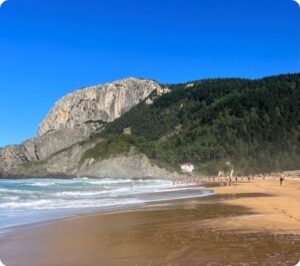
© Tom Benjamin Rummel
The standard working hours spanned from 8:30 to 18:30, including a long lunch break lasting an hour or sometimes even more. Colleagues, including myself, brought their own meals, creating a communal atmosphere during shared lunches and occasional ping pong matches.
Professionally, this period was pivotal as I undertook increased responsibilities within the company, starting with the management of my own small-scale project. English served as the primary working language, contributing to a cohesive and collaborative environment.
The office, characterized by an average age of around 28, has a cohesive and homogeneous team with shared interests. Social activities played a significant role, with a weekly soccer match against other local companies and Friday afternoons often concluding work a bit earlier. This allowed the team to go out into the lively streets of Bilbao, fostering the relations beyond the activities of the workplace.
- Free time/tips
Leveraging free time in Bilbao was an awesome exploration, as the city offered diverse options throughout the week, each drawing a varied crowd of locals spanning all age groups.
Going into different restaurants and locales became a personal priority whenever time allowed, though the city’s richness proved too big to conquer fully, even in its seemingly “small” boundaries.
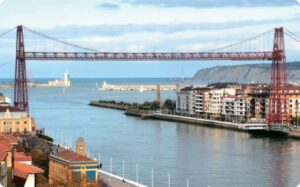
© Tom Benjamin Rummel
Three standout memories summarize my time in Spain. Foremost among them was the exploration of the seaside. The Atlantic coast unfolded a breathtaking panorama with expansive beaches, rough cliffs, and scenic paths for hikes or runs. The autumn weather allowed for enjoyable beach days, easily accessible within 30 minutes from the city center via the metro, costing just 50 cents. The surrounding regions revealed more treasures, showcasing diverse beaches and natural habitats.
On the opposite side of Bilbao lay the mountains, offering beautiful hikes with stunning views. Noteworthy expeditions included a 20 km hike to Gorbea in November and a spontaneous walk to Pagassari, a mountain right next to Bilbao. The accessibility of the countryside was evident as I strolled directly from my apartment, exemplifying the accessibility of nature next to urban living. Every favorable weekend weather was used by me to explore new surroundings, still leaving plenty of unexplored spots for future visits.
December presented an opportunity to make use of national holidays in Spain. A fellow intern and I used this chance to embark on a five-day adventure to Barcelona. The trip, undertaken by bus, a common mode of transportation in Spain, was a seven-hour journey.
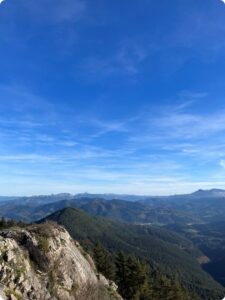
© Tom Benjamin Rummel
Barcelona welcomed us with pleasant weather and some Christmas markets, making the experience an unforgettable highlight of the whole season.
- Conclusion
Reflecting on my Erasmus internship at FEV Consulting in Bilbao, the experience surpassed my expectations in various ways. The seamless application process
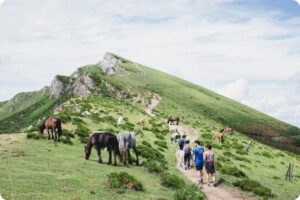
© Tom Benjamin Rummel
, coupled with the early acceptance, allowed me to embark on this adventure well-prepared and with anticipation. Living in Bilbao proved to be important for professional growth and personal enrichment. The daily routine, centered around a dynamic work environment, was complemented by the vibrant and diverse offerings of the city. The accommodating living situation, with engaging flat mates and reasonable living costs, added to the overall positive experience.
Professionally, the internship provided invaluable opportunities. From managing my first project to enhanced responsibilities, the exposure and guidance received significantly contributed to my professional development. The language-intensive work environment in English and the cohesive team dynamics created an atmosphere for learning and collaboration.
Beyond the workplace, Bilbao offered a rich diversity of experiences. Exploring the city’s culinary delights, embracing the natural beauty of the Atlantic coast and nearby mountains, and seizing opportunities for travel, particularly to Barcelona, added memorable dimensions to my time in Spain.
In conclusion, my Erasmus internship in Bilbao was a holistic journey encompassing professional growth, cultural immersion, and personal exploration. The memories stay, both within the workplace and beyond, will undoubtedly remain an important part of my academic and professional journey. As I look back, I am grateful for the experiences gained and the connections made, eagerly anticipating the chance of returning one day to continue the exploration of this region.
Internship in Madrid
- Political Science Ma.
- Spain, Madrid
- Goethe-Institut Madrid
- 09/2023 – 12/2023
- application process

© Dinah Schmidt
I started learning Spanish during my bachelor’s degree and had long planned to spend some time in Spain. In September 2022 I applied for the three-month internship in the cultural department of the Goethe-Institut Madrid. The online application consisted of my CV, a certificate of study, and a letter of reference from one of my professors/lecturers. In addition, i was required to answer a few questions about my previous experience, my interests, and my ideas. Then, in December, I received my acceptance on time as a Christmas present. Since then, I have been improving my Spanish skills with language courses and looking forward to my stay. In the summer of 2023, as the start of my internship approached, I started to prepare myself more intensively. Among other things, I studied the history of the city and the cultural offerings and scenes. Then it all started in mid-August! I combined the outward journey with a road trip through Belgium, France, and Spain. Over three weeks, we explored the coastal strip from Bordeaux to Llanes and then travelled through the mountains to Madrid. The traffic on Madrid’s motorways is a definite turn-off!!!
- Accommodation and Living Expenses
I knew from other reports that it would be very difficult to find accommodation and that I would have to be careful not to get screwed. As I didn’t have time to travel a few weeks before the start of the internship to look for a flat on the spot (or preferred to spend the time travelling), I used the Spotahome app. This gave me the certainty that the flat definitely existed and the deposit was only transferred to the landlord after I had given feedback that the flat looked as advertised.
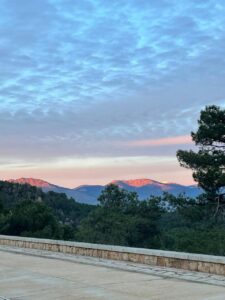
© Dinah Schmidt
Of course, this security also came at a cost. In hindsight, I would recommend looking for accommodation locally rather than from Germany – but it was important for me to have a firm commitment for a room before the start of the internship. I lived in a shared flat with four people who were all only in Madrid for a few months to study. The flat was on the edge of a very nice neighbourhood (Salamanca) on a large roundabout – fortunately in the back building. My room was very small but nicely furnished and had a window. The flat only had a small kitchen, was very noisy and all in all was not in very good condition. The rent was 570 euros per month (!!!) which is very high for this property compared to German rents. Especially when you consider the difference in income between Germany and Spain. In the end, the decisive factor for me was that the Goethe-Institut was easy to reach from the flat. It was just under 25 minutes on foot and a quarter of an hour by metro without changing trains. The cost of living was not much lower than in Germany, only bar and restaurant meals were slightly cheaper.
- Everyday life/the internship
The working hours at the institute were Monday to Friday from 9:00 to 18:00. As part of the cultural work, events were regularly scheduled in the evening, which provided a great deal of flexibility in terms of time on site. On the one hand, the internship involved several continuous tasks and,
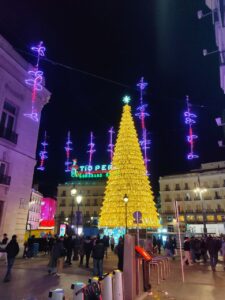
© Dinah Schmidt
on the other, offered me a wide range of opportunities to get involved in events. One regular task was to fill the Goethe-website-programme with content and revise it. I also provided support in the areas of communication and social media presence. This included creating events, application posts and reminders, but also conducting interviews with various artists/residents. Another very enjoyable and exciting task was looking after the residents and the institute’s guest flats. I had an overview of when an artist was arriving and departing and was able to welcome them. As a result, I got to know many artists (dance, theatre, cinema, sound, painting, …), theorists and researchers from all over the world during my internship. As part of the FLIPAS-project, workshops on a wide range of topics were made possible through the cooperation of several European cultural institutes in Madrid, cultural institutions and social organisations. These workshops took place in social organisations, museums or other institutes and focused on enabling young people in difficult circumstances to take part in cultural projects, establish contact with international artists, get them excited about the topics and create a great group experience together. As part of this project, I was able to take part in almost all the workshops and assist with translating and documenting them. This allowed me to get to know cultural and social centres, visit theatres and museums in Madrid’s city centre and the surrounding area, and network with a wide variety of people involved in cultural work.
- Free time & tips
The weather in Madrid was wonderful. We could sit outside until the beginning/mid-November and even in winter it was light until 6 p.m. and most days were characterised by bright sunshine. People’s rhythms start and end later than in Germany. The attitude to life is more relaxed and people get together longer in the evening and eat later and more extensively. I can definitely recommend the tapas culture. At the institute, six of us shared an office and were able to spend our breaks together and explore the city. We visited the large and smaller museums in Madrid and took the opportunity to visit some theatres and information events on various topics via the institute. The Reina Sofía Museum has a collection of recent Spanish art and exhibits documents from Spain’s history of protest – I was very impressed. I should not forget to mention the beautiful Retiro Park and the very picturesque and culturally interesting
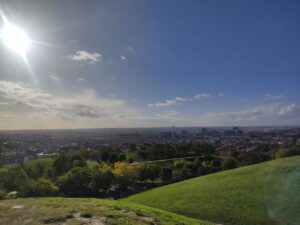
© Dinah Schmidt
neighbourhoods of Lavapiés, Malasaña and La Latina. Madrid never sleeps – In the evenings and at the weekend, I visited some of the countless beautiful bars and clubs. (Favourite bar here: La Venencia – a quaint pub with an interior from the last century, where the Republicans met during the Civil War, with good sherry and delicious tapas) On the long weekends, I went on a trip to Valencia with friends, hiked the mountain regions around Madrid (Navacerrada was very nice), visited the nearby city of Toledo and the historical memorial site “Valle de Cuelgamuros” (also highly recommended). I really liked the Tío Pío Park in the Vallecas neighbourhood for its beautiful views over the city and, of course, the views from the various rooftop bars.
- Conclusion
To summarise, I can definitely recommend an experience abroad in Madrid and an internship in the cultural department at the Goethe-Institut Madrid. I really enjoyed it and the tasks I was given enabled me to surpass myself and make lots of contacts in Madrid and Spain. This experience abroad has also made me want to take on more projects abroad in the future, especially in Spanish-speaking countries. Finally, I have grown very fond of the people I met in Madrid, and I look forward to maintaining these contacts.
Research Stay in San Sebastián
- Teaching and Research Logopedics M.Sc.
- Spain, Donostia-San Sebastián

© Anne-Kathrin Mahlke
- Basque Center on Brain, Cognition and Language (BCBL)
- 09/2023 – 12/2023
- Application / Finding an Internship
Finding the group and supervisor, and even deciding to do an Erasmus+ research stay abroad was a total stroke of luck. I knew that I wanted to look into young children’s language development in my master’s research project and had been searching for suitable research groups within Germany. By chance, another student who had just returned from her own Erasmus+ research stay at the BCBL in San Sebastián in Spain reported about it in a colloquium – and talked about doing exactly the kind of research I knew I wanted to do. Then it was just a question of being brave enough to send an e-mail to the leader of the group she had worked with, asking about the possibilities for a research internship. After sending my first e-mail, I did not hear anything back for over two weeks – and almost gave up on the whole idea. Only thanks to my partner’s relentless encouragement did I bring up the courage to send a reminder – and to this day I am deeply greatful for his engouragement! I heard back from the supervisor almost immediately, and she was very open to me visiting her group!
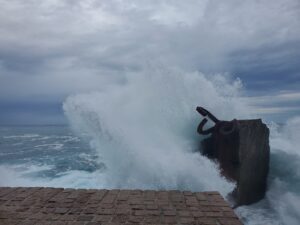
© Anne-Kathrin Mahlke
After agreeing on a time frame for my stay, extensive preparations began: we started discussing possible topics for my research project, which mostly meant a lot of paper reading on my side. I also asked one of my professors in Germany for his co-supervision, as this is required in my program. In parallel, I started the application process for the Erasmus+ support. After reading all the information on the application, this took time, but was fairly easy. I was lucky that all people involved – my supervisor in Spain, my supervisor in Germany, and the adminstrators involved – were extermely helpful and available for any questions or requirements I had.
- Accomodation & Living expenses
Although it is a smaller city, unfortunately, San Sebastián is one of the most expensive places to live in Spain, and finding accomodation is not easy. Single rooms in shared appartments can easily cost 400-600 € per month. Fortunately, my supervisor was able to connect me with a Guest House for visiting researchers, in which I not only found accomodation quickly, but which would also become the place where I found some of my closest friends during my stay. The high housing prices meant that basically my whole Erasmus+ funding went towards rent during my stay. Luckily, I had some additional funds saved, and the cost of food and everyday life in Spain is quite low.
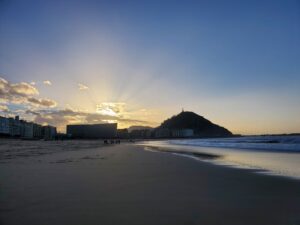
© Anne-Kathrin Mahlke
- Everyday life / The internship
As I had done a lot of theoretical preparation for my research project already in Germany, I was able to jump straight into work at the institute. Still, there was a lot to learn. I was assigned days on which I was required to help in the BabyLab, and in the first few weeks spent any free minute there in order to quickly get to know the different experiments and methodologies. Even though most families visiting the BabyLab spoke Spanish and/or Basque, and I am not fluent in either of these languages, I could quickly pick up many of the more technical tasks, or entertain the babies, for which language is not too necessary. Since I was conducting an EEG study, I also started learning the necessary data analysis methods. Between regular meetings, presentations, reading, writing, programming, and lab duties, I quickly fell into a busy, but extremely productive routine.
The group and my supervisor were great at welcoming me and including me in the proceedings at the institute. Since the BCBL is a small, close-knit community, many people came up to me, introduced themselves, and asked about my plans for the stay.
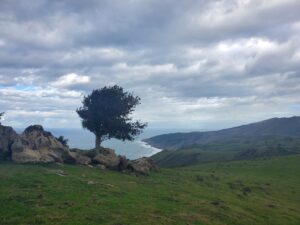
© Anne-Kathrin Mahlke
Interacting with so many people who are all interested in the same topics I am interested in, and hearing about all their amazing research was probably one of the greatest experiences during my stay at the BCBL.
My supervisor made sure to give me a lot of freedom and simulteaneously providing enough guidance for me to successfully progress through my project. I also received a lot of support from other members of the group, and have formed some great friendships. Since the group is rather new and mostly made up of PhD students and young postdocs, we were all in similar situations and could help each other, which created a great atmosphere. I am very much looking forward to watching all of them grow throughout their academic career and to meeting them at many conferences to come!
- Free time / tips
Although still relatively unknown, the Basque Country is an amazingly beautiful place with a very high quality of
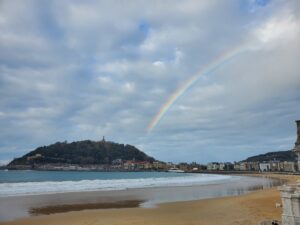
© Anne-Kathrin Mahlke
life. This is especially true for San Sebastián. Donostia (as it is called in the Basque language) has one of the highest densities of Michelin stars per inhabitant in the world, and it is hard to find a bad restaurant in the city. The culinary speciality are Pintxos, small bites of food that are usually taken with a glass of local wine. San Sebastián also provides a lively cultural scene, with exhibitions, concerts, sports events, and much more. Some of the highlights during my time there were a rowing regatta which basically became a big festival, and the San Sebastián Film Festival. A big international community provides cultural diversity, while at the same time the Basque culture and language are ubiquitous and greatly influence everyday life. Furthermore, San Sebastián has great public infratstructure with a well working and cheap public transport network and quite well connected bike lanes (even though the mountains make these a tiny bit less attractive).
For me, probably one of the most enjoyable aspects of San Sebastián and the Basque Country are its landscapes. With the atlantic ocean on one side and impressive mountains on the other side, the area provides endless opportunities for outdoor activities. Hiking, surfing, climbing, swimming – even though I only managed to do a fraction of the things I had planned to do, I enjoyed every single outing.
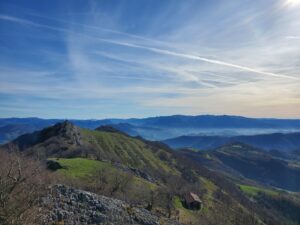
© Anne-Kathrin Mahlke
Even just hearing the waves and seeing the mountains on the horizon on my way to work made every day life a little bit better. One of my favourite things to do when stressed was to walk down from my appartment to the coast and watch the waves for a little while. Now, back to living in Cologne, I deeply miss the sea, the mountains, and the fresh air they bring.
- Conclusion
All in all, my stay in San Sebastián and at the BCBL was an extremely valuable experience. Even though it came about almost by chance, I now see it as one of the most important times during my studies, with regards to both my personal and my academic development, to the friendships and connections I have made, and to the impact it has had on my plans for my future. It is a place I will definitely return to – for holidays or even for a longer stay – and I hope to keep the connections I have made alive. I am also very happy to have helped create and uphold the connection between the BCBL and the RWTH Aachen – as I am writing this, the next student is planning her stay there – and I hope that this will become a long standing and fruitful tradition.
Wonderful Erasmus stay in Madrid
- Chemistry M.Sc.
- Spain, Madrid
- Centro de Astrobiología (CSIC/INTA)
- 09/2023 – 12/2023
Application/Finding an internship
I wanted to go for astrochemistry. That’s the one thing I had in mind when going through all sorts of research institutes in Europe which promised somewhat better weather than Germany. Then, a warm autumn night in Spain must be the perfect addition for stargazing. Eventually, I wrote an email to the Center for Astrobiology (CAB) in Madrid, where I reached out to the Head of the Interstellar and Circumstellar Medium Group. He happily accepted my application and offered me to stay for a research internship in his group. The CAB is a subdivision of the Instituto Nacional de Técnica Aeroespacial INTA, a state institution. There, lots of paperwork and filings were required, but eventually, my stay was official and my badge was ready. Now let’s go, from Aachen to Madrid.
Accommodation & Living Expenses
The campus of INTA and CAB, positioned in the far outer circles of Madrid, and more close to the smaller towns of Alcala de Henares and Torrejón de Ardoz, made me take a 45-minute bus ride from Madrid every morning. I could have chosen to live in the smaller towns. but would I want to miss, living in the centre of one of the biggest metropoles of Europe? Definitely not! I got myself a flat via the local agency viveyestudia.com, which focuses on accommodations for international students. I had a good correspondence with their agent and got a good comparable price(485€ per month). I went to live with 3 other students from all over the world and immediately made good friends with them.
Madrid itself is huge. I may repeat this, Madrid is huge. Even if the Madrid Metro system is one of the best I personally know, it is still good to live in a well-accessible area. My flat was close to Plaza de Manuel Becerra, a crossing of two highly important Metro lines (2 and 6) and a lively but not hectic area. Perfect to reach everything and still not drowning in the noise of the city. Additionally, the metro is wonderfully cheap and extremely powerful to get everywhere, even far outside of the city with no further expenses (Toledo, El Escorial or the Sierra de Guadarrama) Get yourself a Personal card (TTP) as early as possible and pay 8€ or 20€ per 30 days to get pretty much everything!
To taste some of the best local Spanish culinaries I often went out to pay the extra money but never felt overwhelmed by any prices for food or drinks. Especially for buying groceries and cooking in our own kitchen seemed wonderfully inexpensive (at least in comparison to Germany)
The general culture in Madrid is perhaps the best aspect regarding money and expenses, as most museums, palaces, or other cultural sites are either free or highly subsidized.
Everyday life/ the internship
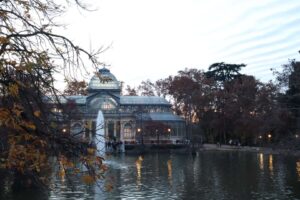
The Glass Palace
© Timon Francis Kielgas
Every morning, during weekdays, there was exactly one bus to get me to CAB. 7:15 in the morning gloom, was when I hoped on to snooze for another bit until I started my day in my Lab at 8. My days either consist of planning or analyzing data from experiments or emptying cups of coffee while letting a simple question about space evolve into a one-hour discussion remotely tangential to my research. Then, perhaps my biggest personal cultural shock, we had lunchtime at 2 p.m., way too late in my opinion, but that’s the Spanish way I was told.
On days when I was absent from the CAB, the weekend and luckily lots of Spanish holidays late in the year, I was adamant, that it is impossible to see everything in Madrid in just three months. After three months this still held true. I spend days on end wandering through Retiro Park, the Prado Museum or the endless bars and tapas places of Malasaña, always finding something new.
Free time/tips
One of the most important things, and as said before, get a Personal card (TTP) for the Metro, as early as possible, because it is that damn good to get around with. To get a great first impression of Madrid I highly recommend the Faro de Moncloa, a tower with a breathtaking observation deck, from which all the important sites of Madrid and its surroundings are visible. Another thing is the Gran Via, which itself is no secret tip because it is THE tourist hotspot. But you have to look up the dates of some special occasion when the Gran Via is closed down for cars to have pedestrians walk all over the place. It’s a wonderful way to observe the vibrant road in a completely different way.
While walking the streets of the Spanish capital, at no point you will go sparse on Spanish European culture. Especially then you have to keep in mind that Madrid is also strongly connected to all the other countries in the Spanish-speaking world of Latin America. If, like me, who has not been to South America before, Madrid is a wonderful place to dive into these cultures as well. Order some Pisco Sour in a Peruvian bar, get a plate of the best Columbian dishes to fill you up or try all the empanadas you can find.
Conclusion
Madrid is a beautiful city, with beautiful weather and wonderful research and researchers. Perhaps my most ambiguous but most remarkable impression was, that everyone I met was super friendly and a joy to be with. While the culture is bright and interesting and the city life is vibrant and beautiful, it was the people I got to work and live with, who made this whole stay the best. I can not tell if it is the field of Astrosciences, if it is the attitude or the people there in Spain, or if it is just pure coincidence, but doing research in this group at CAB just felt good!
I hope others will come to Madrid, have a wonderful Erasmus stay, and share my experience.


